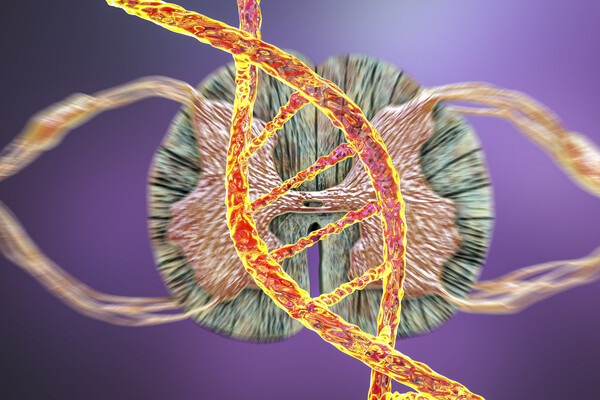5/10
Health Sciences
Penn Students Vie for Top Prizes in Annual Invention Competition: PennVention
PHILADELPHIA –- The Weiss Tech House, a student-run hub of technological innovation at the University of Pennsylvania, announced today the 11 student inventions that will compete in the fourth annual PennVention competition.
Penn Researchers Identify First Sex Chromosome Gene Involved in Meiosis and Male Infertility
PHILADELPHIA -– A team of scientists led by University of Pennsylvania veterinary researchers have identified a gene, TEX11, located on the X chromosome, which when disrupted in mice renders the males sterile and reduces female fecundity. This is the first study of the genetic causes of infertility that links a particular sex chromosome meiosis-specific gene to sterility.
Penn Scientists Find a Protein That Inhibits Ebola From Reaching Out to Infect Neighboring Cells
PHILADELPHIA -– Scientists at the University of Pennsylvania School of Veterinary Medicine have identified a protein, ISG15, that inhibits the Ebola virus from budding, the process by which viruses escape from cells and spread to infect neighboring cells.
Penn Nursing Students Partner With Local High School to Evaluate Elementary Students' Health
PHILADELPHIA –- Students at West Philadelphia’s Sayre High School who are taking a health-education class have been working with University of Pennsylvania nurse practitioner students and Penn School of Nursing faculty to learn accurate growth and diabetes-risk-factor assessment.
Sarah Tishkoff Named Penn's Newest PIK Professor
PHILADELPHIA -– Sarah Tishkoff, a leading global expert in human genetics, has been named the sixth Penn Integrates Knowledge University Professor at the University of Pennsylvania.The announcement was made today by Penn President Amy Gutmann and Provost Ronald Daniels.
Agent Orange Chemical, Dioxin, Attacks the Mitochondria To Cause Cancer, Says Penn Research Team
PHILADELPHIA— Researchers with the University of Pennsylvania School of Veterinary Medicine have demonstrated the process by which the cancer-causing chemical dioxin attacks the cellular machinery, disrupts normal cellular function and ultimately promotes tumor progression.
Penn Researchers Shine the Light of Venus to Learn How the Herpes Virus Invades Cells
PHILADELPHIA -– University of Pennsylvania researchers have uncovered an important step in how herpes simplex virus, HSV-1, uses cooperating proteins found on its outer coat to gain entry into healthy cells and infect them. Further,the study’s authors say, they have demonstrated the effectiveness of monitoring these protein interactions using biomolecular complementation.
University of Pennsylvania Researchers Zero In on the Tiniest Members in the War on Cancer
PHILADELPHIA -– Researchers from the University of Pennsylvania and Johns Hopkins University have uncovered another reason why one of the most commonly activated proteins in cancer is so dangerous. As reported in Nature Genetics this week, the Myc protein can stop the production of at least 13 microRNAs, small pieces of nucleic acid that help control which genes are turned on and off.
Researchers Led by Penn Vet Uncover the Delicate Protein Balance Behind the Immune System Response
PHILADELPHIA -– A team of researchers from the University of Pennsylvania School of Veterinary Medicine has identified the protein interactions involved in the immune system process that fights infection yet, in certain inflammatory diseases, runs amok and attacks friendly tissue.
University of Pennsylvania Establishes Institute for Regenerative Medicine
PHILADELPHIA -- The University of Pennsylvania is launching the Institute for Regenerative Medicine, a new cross-disciplinary endeavor to investigate and harness the therapeutic potential of stem cells in the treatment of cancer, diabetes, cardiovascular disease, degenerative diseases, wound healing and aging. Two renowned Penn scientists, Jonathan A. Epstein and Ralph L.
In the News
What’s going on with tranq?
Jeanmarie Perron of the Perelman School of Medicine says that the appearance and progression of skin ulcers and tissue loss on xylazine users is different than with other intravenous drugs.
FULL STORY →
It’s time to end the Medicare-Medicaid merry-go-round
In an opinion essay, Rachel M. Werner of the Leonard Davis Institute, Wharton School, and Perelman School of Medicine says that Medicare and Medicaid fail to integrate coverage and coordinate care across their two plans.
FULL STORY →
Inside Penn’s transfer center
Penn Medicine’s transfer command center gets patients from affiliated hospitals and hospitals outside Philadelphia to specialized care that can save lives, with comments from CEO Kevin Mahoney.
FULL STORY →
The quest for treatments to keep weight off after Ozempic
Researchers at Penn are conducting a co-authored study of the brains, fat and muscle cells, and eating patterns of people trying to maintain new body sizes.
FULL STORY →
Operating rooms are major sources of greenhouse gasses. Penn is eliminating a form of anesthesia that hangs in the air for more than a decade after use
Penn Medicine is phasing out the anesthesia desflurane at four of its six hospitals to eliminate harmful greenhouse gases, with remarks from Greg Evans.
FULL STORY →





